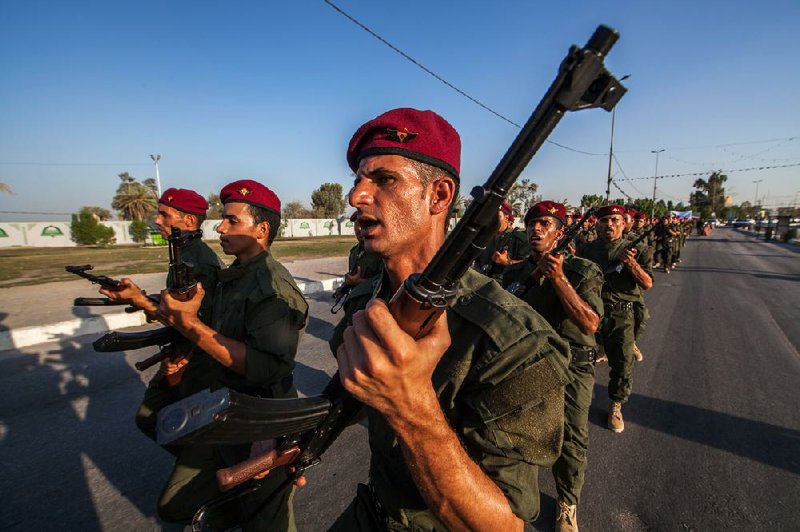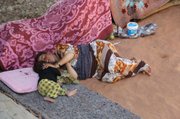Editor's note: The spelling of the name of Iraq's nominated prime minister has changed from Haider al-Ibadi to Haider al-Abadi to reflect a change in Associated Press style.
BAGHDAD -- Nouri al-Maliki, Iraq's prime minister for the past eight years, relinquished the post to his nominated replacement late Thursday, ending a political deadlock that has plunged the country into uncertainty as it fights a Sunni militant insurgency.
Meanwhile, President Barack Obama said a humanitarian crisis atop a barren hill in northern Iraq is over, eliminating the need for a risky U.S. rescue mission. But Iraqis elsewhere face a "dire" threat from the advancing militants, he said.
Al-Maliki, standing alongside fellow Dawa Party member Haider al-Abadi, said he was stepping aside in favor of his "brother," in order to "facilitate the political process and government formation."
He said the decision to back al-Abadi reflected his desire to "safeguard the high interests of the country," adding that he would not be the cause of any bloodshed. "My post is your confidence in me," he declared in a televised address.
Al-Maliki has been struggling for weeks to stay on for a third four-year term as prime minister while opponents have attempted to push him out, accusing him of monopolizing power and pursuing a pro-Shiite agenda that has alienated the Sunni minority.
The pressure intensified this week when al-Maliki's Shiite political alliance backed al-Abadi to replace him, and President Fouad Massoum nominated al-Abadi to form the next government. Al-Maliki for days has refused to step aside, threatening legal action against the president for what he said was a violation of the constitution.
But in a meeting of his party earlier Thursday, al-Maliki agreed to endorse al-Abadi as the next prime minister, said two senior lawmakers from his State of Law parliamentary bloc, Hussein al-Maliki and Khalaf Abdul-Samad.
The lawmakers said al-Maliki also agreed to drop a challenge of al-Abadi's nomination at the constitutional court.
Al-Maliki had grown increasingly isolated as he was deserted not only by his Shiite peers but also by top ally Iran, which joined the United States and the United Nations in backing al-Abadi.
The White House on Thursday commended al-Maliki for backing al-Abadi and expressed hope that the power shift "can set Iraq on a new path and unite its people" against the threat from Islamic militants, national security adviser Susan Rice said in a statement.
The U.N. Security Council urged al-Abadi to work swiftly to form "an inclusive government that represents all segments of the Iraqi population and that contributes to finding a viable and sustainable solution to the country's current challenges."
He will have 30 days to put together a Cabinet for the parliament's approval.
The U.S. and other countries have been pushing for a more representative government that will ease anger among Sunnis, who felt marginalized by al-Maliki's administration, helping fuel the sweep by the Islamic State extremist group over much of northern and western Iraq since June.
The Islamic State's advance has driven hundreds of thousands of people from their homes and last week prompted the U.S. to launch aid operations and airstrikes as the militants threatened religious minorities and the largely autonomous Kurdish region.
Obama on Thursday promised to expand U.S. humanitarian relief to Iraqis threatened by the advancing army of the Islamic State militants. He also took credit for alleviating a genocide threat to thousands of people from the Yazidi religious group who were trapped on a mountaintop but said the situation "remains dire" throughout the country.
Obama also said U.S. airstrikes would continue to protect Americans and U.S. facilities in Iraq, and he said Washington has increased its delivery of military assistance to Iraqi and Kurdish forces fighting the Islamic State.
"We're going to be working with our international partners to provide humanitarian assistance to those who are suffering in northern Iraq wherever we have capabilities and we can carry out effective missions like the one we carried out on Mount Sinjar without committing combat troops on the ground," Obama said in a statement.
A small U.S. military and civilian team spent Wednesday atop Sinjar Mountain to assess conditions and see how many Iraqis needed to be evacuated. They reported that the number of trapped Iraqis was far fewer than anticipated and that U.S.-supplied food and water had reached many of those in need in recent days.
Obama said the U.S. had delivered 114,000 meals and 35,000 gallons of water to the tens of thousands of Iraqis who had been stranded there. They had faced the threat of death at the hands of the Islamic State group if they descended the mountain and possible starvation if they stayed atop Sinjar.
Rear Adm. John Kirby, a Pentagon spokesman, said the team estimated Wednesday that only 4,000-5,000 Iraqis remained atop Sinjar, of which as many as 2,000 are locals who don't want to leave.
Obama said Thursday that no emergency evacuation on Sinjar Mountain is now needed, and he said it is unlikely the U.S. military will continue to airdrop food and water there.
U.N.: Crisis Not Over
Yazidi leaders and emergency relief officials Thursday strongly disputed the U.S. claims that the crisis was effectively over, saying tens of thousands of Yazidis remained on the mountain in desperate conditions.
Speaking from a hospital bed, Vian Dakhil, a member of the Iraqi parliament and a Yazidi leader who was injured in the crash of a helicopter delivering aid to the mountain Tuesday, said she was aware of the U.S. claims and had discussed them with Yazidi leaders still in the area.
"It's not true," she said.
"It's better now than it had been, but it's just not true that all of them are safe -- they are not," Dakhil said. "Especially on the south side of the mountain, the situation is very terrible. There are still people who are not getting any aid."
She estimated the number of Yazidis trapped on the southern flanks of Sinjar Mountain at 70,000 to 80,000.
Dakhil's assessment was supported by U.N. humanitarian officials, who on Thursday were unequivocal that there remained a crisis among the Yazidis on Sinjar Mountain.
"The crisis on Mount Sinjar is by no means over," said David Swanson, the spokesman for the U.N. coordinator of humanitarian affairs in northern Iraq. "Although many people managed to escape from the north side, there are still thousands of others up there, under conditions of extreme heat, dehydration and imminent threat of attack. The situation is far from solved."
The Yazidis, who come from the semiautonomous Kurdish region and practice an ancient religion linked to Zoroastrianism, are regarded as heretics by the Islamic State, which has vowed to kill them all. U.N. officials have expressed alarm at numerous reports that the militants also have raped and enslaved many Yazidi women as forced brides or concubines.
Dakhil said the U.S. military assessment team must have visited the northern side of the mountain, the only area that can be reached by helicopters easily, whereas the greatest problem lay to the south, closer to positions held by Islamic State militants and therefore dangerous to travel to by helicopter.
Kieran Dwyer, the chief spokesman for the U.N. humanitarian coordinator, did not comment directly on the U.S. military's assessment.
"We're not doing a military assessment," he said, "we're doing a humanitarian assessment." From a humanitarian perspective, the problem remains grave, he said.
In a telephone news conference from Dohuk, Dwyer also said that in the past three or four days, "large numbers of people have come off the mountain," but that thousands remain, and "we still need to address that issue."
"The crisis on the mountain will not be over until everyone comes off in a safe and secure manner," he said.
The U.N. on Wednesday declared the situation in Iraq a "Level 3 Emergency" -- a development that will allow for additional assets to respond to the needs of the displaced, said U.N. special representative Nickolay Mladenov, pointing to the "scale and complexity of the current humanitarian catastrophe."
The U.N. said it would provide increased support to the Yazidis and to 400,000 other Iraqis who have fled since June to the Kurdish province of Dahuk. Some 1.5 million people have been displaced by the fighting.
French President Francois Hollande on Thursday also confirmed the "imminent delivery of military equipment" to Kurdish forces in a phone call with the new Iraqi president, Fouad Massoum, Hollande's office said. It did not specify the type or amount of equipment to be given to the Kurds, who have been fighting the Islamic State in northern Iraq.
The statement said Paris also would provide more humanitarian aid. France has sent dozens of tons of aid in several deliveries this week.
Meanwhile, European Union governments are set to explore ways to squeeze the finances of the Islamist militants, who have been bolstered by oil fields captured during their advance through Iraq.
EU foreign ministers at an emergency meeting in Brussels today plan to consider options on oil-market measures and the direct supply of arms to Kurdish forces, an EU official said, asking not be named because the discussions are private.
Information for this article was contributed by Sameer N. Yacoub, Qassim Abdul-Zahra, Vivian Salama, Sinan Salaheddin, Murtada Faraj, Elaine Ganley, Robert Burns, Julie Pace, Ken Dilanian, Lara Jakes, Lolita C. Baldor, Edith M. Lederer of The Associated Press; by Rod Nordland, Sebnem Arsu, Kamil Kakol and Rick Gladstone of The New York Times; and by Jonathan Stearns, Ian Wishart, Rainer Buergin, Mikael Holter, Anna Hirtenstein and Fred Pals of Bloomberg News.
A Section on 08/15/2014



